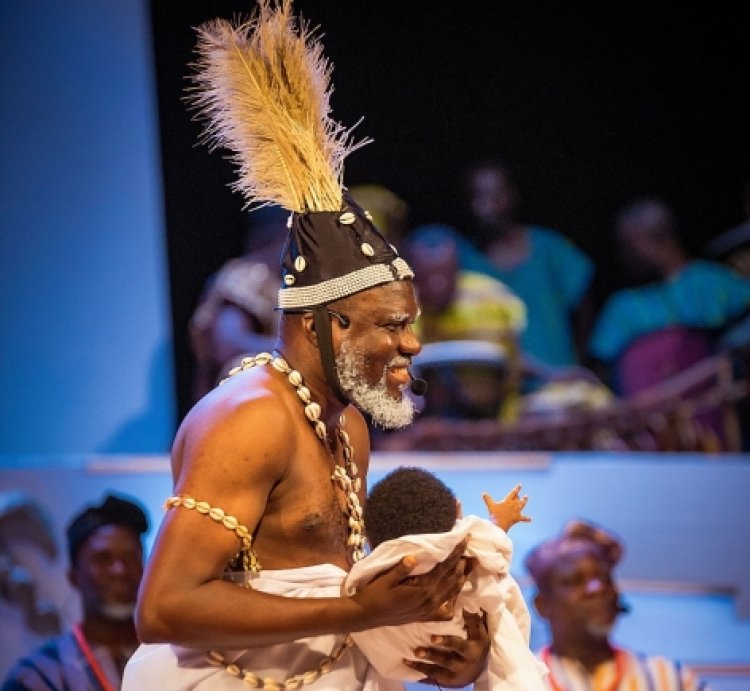Standing ovation for The Gods Are Not to Blame
Maybe the story was old news to most of the crowd that packed the National Theatre on Sunday, December 3 for The Gods Are Not to Blame, which had also been performed the day before on December 2.

Nevertheless, even if you were familiar with the popular drama, which is Nigeria's Ola Rotimi's adaptation of Sophocles' original Greek play Oedipus Rex, you couldn't help but be riveted to your seat for the entire two and a half hours.
The first scene of a masterfully choreographed dance captured the audience's attention right away. As the play's narrator, experienced actor David Dontoh, led the audience through its narrative, the degree of interest increased.
In the depressing story The Gods Are Not to Blame, Odewale—played by actress Naa Ashorkor—is destined to assassinate his father, King Adetusa of Kutuje, and wed his mother, Queen Ojuola.
The royal couple traveled to the priest of Ifa, Baba Fakunle, a blind soothsayer played by renowned theater director and actor Mawuli Semevo, to find out the destiny of their kid Odewale, as he was the firstborn and in accordance with custom.
Baba Fakunle pronounced the fate of Odewale as a messenger of the gods sent to kill his father and marry his mother. He, however, disclosed that the only way to avert the taboo was to kill the baby.
The Ogun priest, played by Fred Amugi, then tied the legs of the baby, as a sign that he was cursed, and ordered the king’s messenger, Gbonka, to go kill him in the forest.
Filled with compassion, Gbonka spared the life of the innocent baby and gave him to Ogundele, a hunter he met in the forest.
That was, therefore, the beginning of the prophecy of the gods, which saw Odewale go through all the phases of life and play into the gallery of the gods because of his hot temper.
This hot temper drove him out of his adopted parents’ home when a relative boldly told him he was a butterfly thinking himself a bird.
This same hot temper caused him to kill an old man who turned out to be King Adetusa, his biological father, during an argument over ownership of a piece of farmland.
As the gods willed his destiny, Odewale found himself in Kutuje after 32 years and led the people to fight their enemies in war.
The people of Kutuje defy tradition and crowned a stranger (Odewale) king, for leading them to win a battle. King Odewale married his mother, Queen Ojuole, bringing to fulfilment the prophecy of the gods.
They gave birth to four children—Adwale, Adebie, Oyeyemi and Adeyinka. However, the joy of the people of Kutuje was short-lived when they were hit with plagues.
Aderopo, the second son of King Adetusa and Queen Ojuola, was sent to consult the priest of Ifa, who told them the murderer of their former King was living peacefully with them, thus the cause of their predicament.
Performances
Scene after scene, the actors brought their A-game on. For instance, one of the best scenes was when the priest of Ifa, Baba Fakunle, was brought to the palace to tell King Odewale and his sub-chiefs the cause of their curse.
The exchange between Baba Fakunle and King Odewale played by actor Andrew Tandoh Adote is worth commending.
It was an epic scene that got patrons applauding for a long, with the raw display of emotions by both characters. Indeed, the insult of Baba Fakunle to King Odewale as a bed sharer will certainly stay in the minds of patrons.
Besides, Naa Ashorkor’s (Queen Ojuola) cry of pain and betrayal from the gods, upon learning the truth and the fulfilment of the prophecy of the gods, was emotional.
The eerie quiet in the auditorium revealed how many, some of them in tears, could connect to her suffering at being married to her own son and having children with him—a highly forbidden subject.
As King Odewale stated in the previous scenario, since the gods just take advantage of human frailties, "they are not to blame." In his case, the gods used his fiery anger to bring about the fulfillment of their life-ending prophecy.
The play's standing ovation at the conclusion demonstrated how much theatergoers valued the excellent production of The Gods Are Not to Blame, which was a joint effort by the National Theatre, George Quaye's Image Bureau, and April Communications' Naa Ashorkor.

 Boakyewaa Lawrencia
Boakyewaa Lawrencia 


































